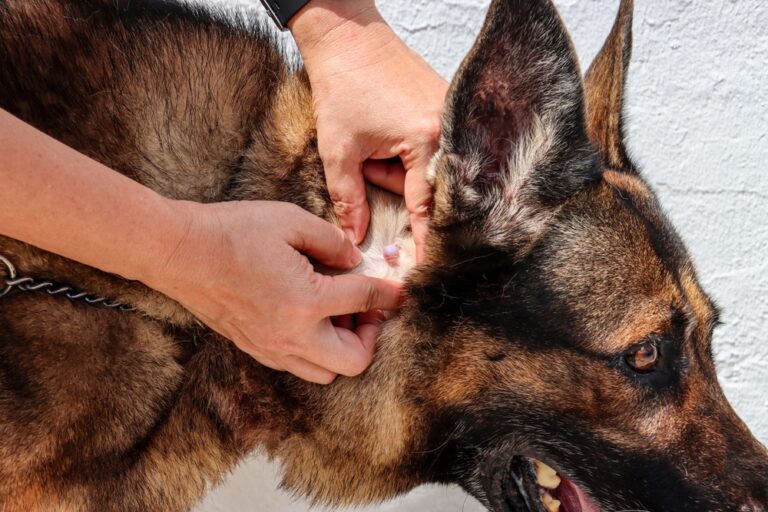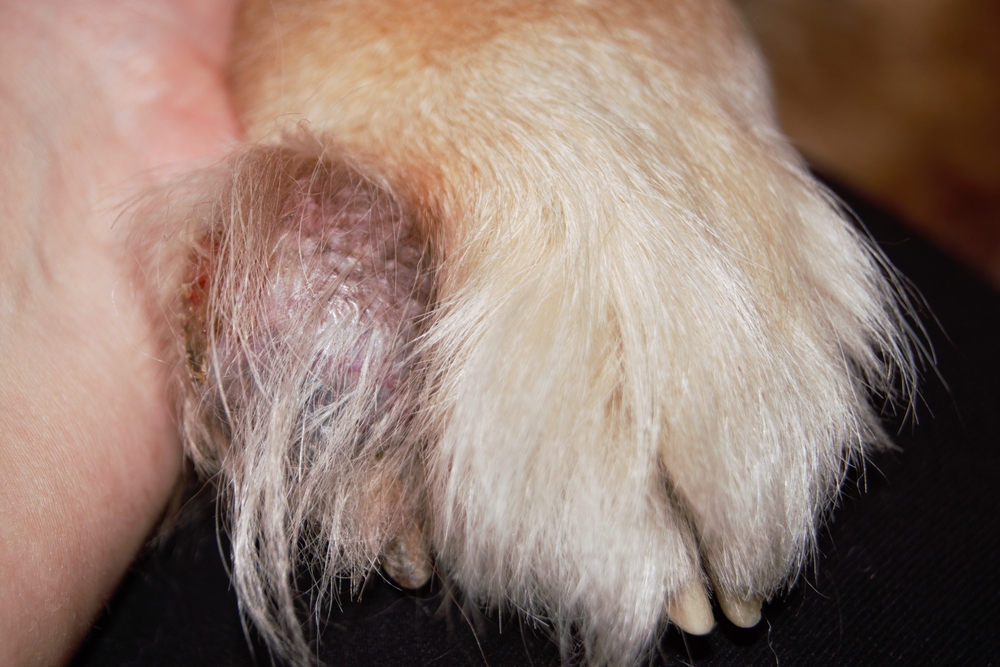It can be occupy to discover a lout or dislodge on your dog . Many the great unwashed fear a serious diagnosing is around the corner , but not all glob and bumps are cancerous . In fact , many merely turn out to be benign cysts . Several type of cyst can develop in dogs , and some breed are predisposed to them . Nevertheless , having anylumpsevaluated by a vet is of the essence so an precise diagnosing can be made and appropriate handling can begin .
What is a Dog Cyst?
A cyst is an enclosed pocket of tissue that anatomy within the skin and is filled with fluid or hearty material . Cysts are most commonly found by pet parents when they are petting or brushing their dog .
vesicle and tumour can occur in various locating on a domestic dog ’s body . While they may look similar because they are round and protrude from the skin , several fundamental differences exist . While vesicle tend to develop slowly over clip , the growth rate of tumour can vary . cyst on dogs are mostly soft ( although some can finger more or less firm ) , while tumour are mostly solid and not easily movable . Cysts are benignant , while neoplasm can becancerous . Treatment options for cysts and tumour are vastly different , so it is important to consult a vet for an exact diagnosis .
WhatCausesDog Cysts?
Cysts can develop for various reason , includinginflammation , trauma , and extravagant grooming . Sometimes , hair follicle and skin secreter become clogged and run to cyst constitution . cyst can occur in dogs of any age , and some strain have a genetic predisposition for them . They are especially vulgar inCocker Spaniels , Boxers , Golden Retrievers , and Schnauzers .
Types of Cysts on Dogs
Many case of cysts can be found on hot dog . Because many lumps and hump look similar , a visit to the veterinary is required to identify which typewrite your dog may have .
True Cyst
truthful vesicle are lumps stop hoard fluid secreted by cells within their lining . These type of cysts on dogs can vary in sizing depending on how long they are present and are unremarkably soft due to the collect fluid . True cysts are not harmful to dogs but can be vexing reckon on their localisation and size . If punctured , they can leak fluid , which may dry and form crusts on the surround fur .
Follicular Cyst
Follicular cysts get up from the hair’s-breadth follicles of dogs , and they can be found on many role of the body , especially the muzzle . Follicular cyst are small , orotund lumps more or less firm to the touch . They are typically fill with a thick material eff as ceratin , which may ooze out if the vesicle is puncture . They are ordinarily not painful for dogs but can becomeitchy and infect .
Sebaceous Cyst
Sebaceous vesicle rise from sebaceous secretor that release a thick , oily sebum . When this substance builds up within the secretory organ , cyst organisation can come about . Sebaceous cysts can be found anywhere on the consistency , specially the head , cervix and eyelid . They can vary in size of it and typically contain an oily fluid or a compact , whitened - to - yellow material . They are generally harmless but can become inflame and irritated in some instances .
Interdigital Cyst
Interdigital cysts are found on adog ’s pawbetween their toes . These eccentric of cysts on wienerwurst are typically firm and not easily moveable . They are small to spiritualist and can become irritated and inflamed because dogs oftentimes lick them . They may also bleed or exudate tenuous , unmortgaged - to - yellow fluid . They are benignant but can be painful for dogs count on the vesicle ’s size of it and location on the mitt . These cysts also be given to be associated with contagion .
Dermoid Cyst
A dermoid vesicle is a congenital irregularity that occur due to abnormal development . These cyst incorporate keratin , a thick cloth that usually makes up skin and hair . They can seem in groups or as a single cyst ; many have whisker follicles protrude from their center . Rhodesian Ridgebacks and Boxers are predispose to have these cysts [ 1 ] .
DiagnosingTypes of Cysts on Dogs
To diagnose the type of vesicle your dog has , a veterinarian will first complete a physical examination and note limit characteristic , such as sizing and location , of the chunk . Then , the vet will take a small sample using a phonograph needle . The sampling is viewed under a microscope , and if the cells are characteristic of a cyst , the vet can make a preliminary diagnosis and offer discourse choice .
bet on the type of handling recommended , bloodwork may be done to appraise the detent ’s overall wellness , and the sample can be sent to a diagnostician for additional testing and revue . An exact diagnosis of any lumps or gibbosity on adog ’s skinis significant to ensure the appropriate handling option is offered .
TreatingCysts on Dogs
Some cysts may not involve treatment at all . However , if a cyst warrant treatment , possible option let in topical or unwritten medicine , draining of fluid , and surgery . medicine may let in antibiotic drug or anti - instigative medications , peculiarly if a bacterial contagion occurs . For some cysts , run out the conglomerate fluid or thickheaded textile using a syringe can provide ease , peculiarly if the cyst is located in a high - pressure area or curtail movement . Unfortunately , only draining the cyst is only a impermanent solution , and the cyst will finally refill .
operative removal is often recommended for vesicle that are unresponsive to other intervention alternative or that continue to replenish . During OR , the outer layer and all enclose material is remove . The surgery uses general anaesthesia , so it may not be an option for all dogs , particularly those with underlying medical conditions . Dogs typically endure cyst remotion OR and recovery well . Pain medicationis commonly order to be yield at nursing home , and in some illustration , antibiotic therapy may also be started . A recheck appointment between 10 - 14 days following surgery is usually done to see to it the dent site is healing well and there are no new concerns with the region .
FAQsAbout Dog Cysts
Yes , cysts on frankfurter can rupture . Sometimes , this occurs from ego - harm due to the cad cream oritchingthe touched country . Other times , pressure from the fluid or material within the cyst becomes so gamey that it do the tegument to separate , forming a small opening where it can leak . Pet parent typically notice that a vesicle on their weenie has ruptured due to the dried crusts and matted fur that sort in the surrounding sphere .
If pet parents notice a cyst on their firedog has tear , they should visit a veterinary surgeon for discussion . The veterinarian can houseclean the vesicle area to ensure an contagion does not develop and provide pain direction and topical medications to help keep the dog comfortable . A bandage may also be enforce to keep the area white and dry while it heals . This also permit the veterinary surgeon and best-loved parent to talk about foresightful - term treatment choice , such as surgery , to conclude the condition in full .
vesicle on dogs are typically benignant . While some types of vesicle can develop quite with child , they do not check cancerous cells . However , cysts can calculate very like to many type of tumors , so it is important to consult a veterinarian if pet parent notice any new lumps developing on their dog so that an exact diagnosis can be made .

Most cyst are not typically painful unless they restrict movement or are very big , in which case surgical removal can assuage these symptoms . Some eccentric of cyst can be uncomfortable or cause itchiness due to their position or skin stretching in the affected area . If a dog scratch the cyst and make a wound , it can potentially become infected , which can result in pain .
Pet parents should never seek to thrust or pop any lumps or protuberance found on their dogs , as this can stimulate inflammation and irritation . What may look to be a small cyst could be something more serious , and popping it could result in an adverse reaction . Instead , pet parents should visit their veterinarian , who can provide appropriate treatment .
References
neoplasm of the Skin in Dogs – Dog Owners – Merck Veterinary Manual ( merckvetmanual.com )




